At Least Six Die In Mud, Landslide North Of Capital Tehran
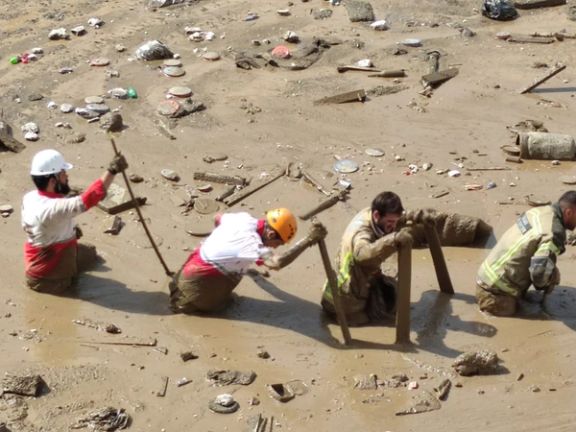
At least six people have been killed and nine are injured in flash floods and landslides triggered by heavy downpours in areas north of the Iranian capital Tehran.

At least six people have been killed and nine are injured in flash floods and landslides triggered by heavy downpours in areas north of the Iranian capital Tehran.
According to the country’s Red Crescent, rescue operations are still underway on Thursday to find at least 14 people who are reported missing.
According to reports, at least one more died in the city of Roudehen, northeast of Tehran, and two children were killed in the city of Zahedan, in the southeastern province of Sistan-Baluchestan.
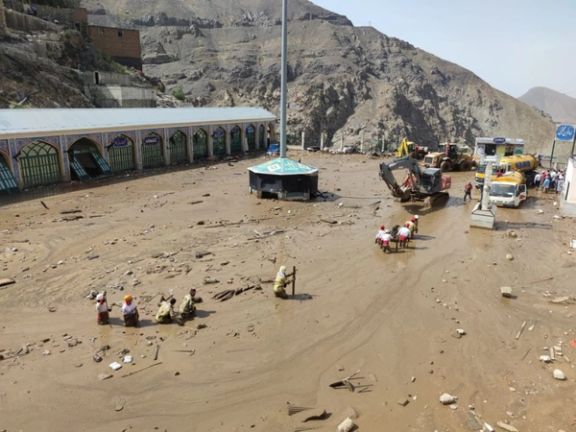
One of the places worst hit by mud and floodwater is the complex of the shrine of Imamzadeh Davoud, a Safavid-era mosque northwest of Tehran, where dogs are helping relief workers to find the bodies of victims or the trapped people. The mosque dates back to the era of Safavid dynasty (1501-1736) and lies close to Tochal ski resort in the Alborz Mountains, one of the city's popular trekking routes.
The flash floods started around 2:00 a.m. local time on Thursday after a heavy downpour resulted in landslides and mudslides in the foothills of Tehran’s Alborz mountains, officials said, adding that more precipitation is forecast for the area in the coming days.
On July 22, heavy rains and subsequent flash floods in three cities of the southwestern Fars province left at least 22 dead.
Iran has been suffering from drought for at least a decade and this year officials have been warning of a further decrease in precipitation. However, Iran’s metrology department had warned about possible heavy seasonal rainfall across the country. The dangers of flash floods have been exacerbated by the widespread construction of buildings and roads near riverbeds.
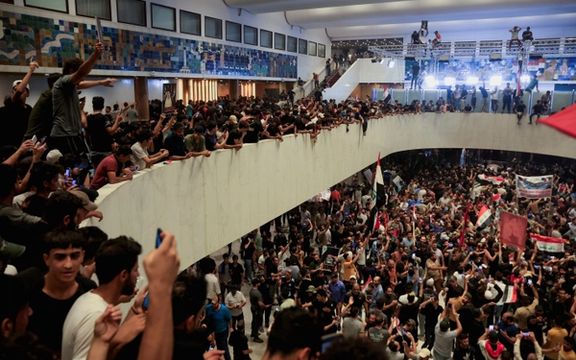
Hundreds of followers of an Iraqi influential Shiite cleric stormed into Baghdad's Green Zone and parliament Wednesday, chanting anti-Iran slogans against a Tehran-backed prime ministerial nominee.
The protesters – some of whom were seen walking on tables, waving Iraqi flags and sitting in lawmakers' chairs – were followers of Muqtada al-Sadr, who seeks to curb the influence of the Islamic Republic in Iraqi politics.
On Monday, the Coordination Framework, a coalition of Shiite parties close to Iran, nominated Mohammed al-Sudani as the prime minister, a decision opposed by firebrand Shia cleric al-Sadr, whose party won last year’s general elections.
Protesters, who had forced their way into the Green Zone, which houses the parliament, after removing a number of concrete barriers, began making their way out of the parliament building when al-Sadr issued a statement on Twitter telling them their message had been received and "to return safely to your homes.
Addressing the protesters, the leader of the Sadrist movement, Saleh Muhammad al-Iraqi, said, "I stand in reverence and respect. It is a wonderful spontaneous and reformist popular message, thank you."
It was the largest protest since federal elections were held in October and the second time al-Sadr has used his ability to mobilize the masses to send a message to his political rivals this month.
The protest took place after Iran’s Revolutionary Guard’s Quds Force Chief Esmaeil Gha’ani arrived in Baghdad, one day after Iran-backed groups nominated Sudani, and met with leaders of Shiite groups.

Iran’s Supreme Leader claimed Wednesday that the anti-hijab movement is nothing but a Western plot, much like his depiction of all problems as plots by enemies.
Ali Khamenei claimed that wearing the hijab is no impediment to Iranian women’s progress and accused the West of fueling the recent opposition to hijab to harm the regime.
In a speech to a gathering of prayer leaders from across the country on Wednesday, Supreme Leader Ali Khamenei said in his view the Islamic Republic does not need to defend itself about issues related to women including the hijab but should rather be aggressive and attack the West for turning women into a “commodity”.
Iran’s government which is now fully controlled by hardliners has adopted a harsher than usual approach amid economic crisis and hardship for tens of millions. Government and military officials have warned the population against disobeying hijab rules and the morality police hijab enforcement patrols have detained many women, sometimes violently, on the streets.
Several activists and many ordinary citizens have been arrested for their defiance of the hijab rules in July. On several occasions the members of public have interfered when morality police and hijab enforcers tried to detain women for not wearing what the authorities consider as “proper hijab” and freed them.
The Iranian leader claimed that observing the hijab has not prevented Iranian woman from great achievements in various fields despite Western countries’ arguments that women cannot progress “unless they free themselves of ethical and religious bonds.”
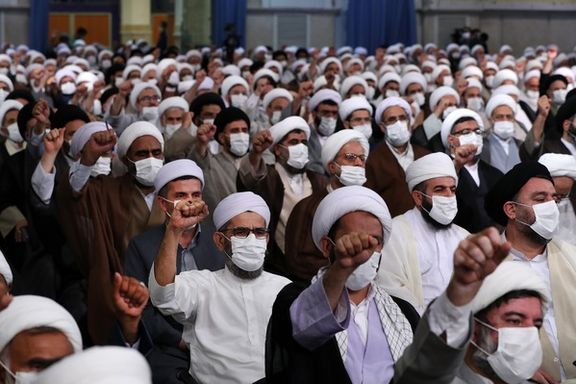
He also alleged that “the enemy”, which he said is “led by Zionists and capitalists”, is constantly plotting to harm the Islamic Republic in the “battlefield of soft power” and seeks to destroy people’s faith by fostering doubt in their minds about issues such as the role of women in the Islamic society and women’s hijab.
Referring to discussions over the issue of hijab in Friday prayers, the media, and social media, Khamenei said everyone should act “very gracefully, logically and wihtout from unnecessary emotions” on the issue of hijab and use clear reasoning “to expose the western colonialist attitude” in rejection of hijab.
On Wednesday some hardline and state-affiliated media published a video of the so-called “confessions”of an anti-hijab protester who was arrested because of a confrontation with a hijab enforcer in a city bus in which the two women are shown speaking about the incident and “the lies” of the anti-hijab activists. The anti-hijab protester then begs “forgiveness” for picking a quarrel with the hijab enforcer and the two of them embrace each other and make peace.
The woman identified as 28-year-old writer Sepideh Rashno was arrested soon after the encounter on the bus. An informed source told Iran International that the woman seen in the “confession” video is not Rashno as hardline media such as Hamshahri have claimed but another woman who also was involved in the fight over hijab on the bus.
Rashno has reportedly been in detention at the IRGC ward of Tehran’s Evin Prison since her arrest last week without any contact with her family or access to a lawyer. Authorities have told the family that Rashno’s case is being investigated by the prosecutors of Evin.
Authorities have even started policing the compulsory Islamic dress code – or hijab – on the tombstones of the country’s largest cemetery, located in the southern part of the capital Tehran, and removed about 100 gravestones which had pictures of deceased women without veils.
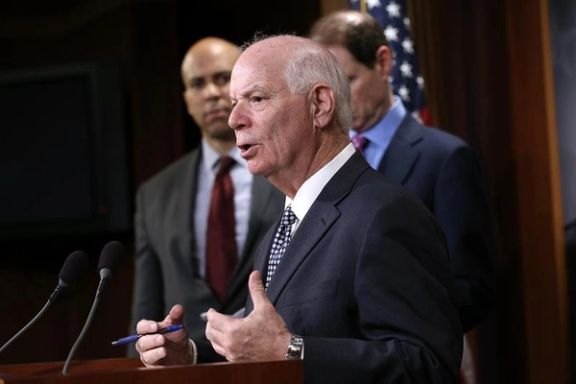
A US Senator has described Iran’s violations of human rights as outrageous, calling on his fellow lawmakers to be more aggressive about addressing the issue.
Maryland’s Democratic Senator Ben Cardin told Iran International, “The current regime in Iran has so many different challenges, but one that we sometimes do not recognize as well as we should is its violations of internationally-established human rights standards. That's outrageous, just outrageous.”
Answering a question about Iran threatening its people against sending videos to New York-based anti-hijab activist Masih Alinejad with up to 10 years in jail, he said that “We have to speak out, and we need to do what we can to protect the human rights of people who are courageous standing up for just basic international rights.”
Iran’s Headquarters For Enjoining Right And Forbidding Evil, tasked with promoting the clerical regime’s interpretation of Islamic laws, said on July 23 that any cooperation and sharing videos with Alinejad will be considered a violation of Article 508 of the Islamic Republic’s Penal Code, and can result in one to ten years imprisonment.
Cardin called on the Senate to spotlight such human rights violations, saying, “We (in the Senate) already have a sanctions regime against human rights violations. That's been deployed in Iran. We just have to be very aggressive and use the tools that are at our disposal.”
Iran’s security organs have also started arresting women who participated in a nationwide civil disobedience campaign July 12 against hijab.
Following a call by women’s rights activists – including Alinejad -- for civil disobedience with the hashtag of ‘No2Hijab’ social media exploded with dozens of videos and photos of women unveiling in public.
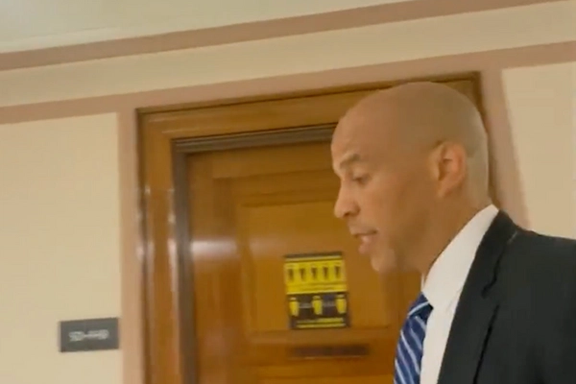
US Senator Cory Booker expressed concerns about growing cooperation between Tehran and Moscow amid the Russian invasion of Ukraine.
Talking to Iran International’s correspondent Arash Aalaei on Wednesday, the New Jersey Democrat said, "I have concerns about Iran's actions in numerous parts of the globe, and it is something my team and I work very hard on, and we take very seriously."
Noting that Congress is working on some measures to stop the Russo-Iranian axis in the Ukraine war, Booker said, "We are already making a lot of efforts. The (Senate Foreign Relations) Committee has taken bipartisan stands and will continue to do what is necessary to check the Iranian Russian and terrorist activities."
US National Security Adviser Jake Sullivan warned twice in July that Moscow appears to be looking at buying Iranian drones and Russian officers even visited a drone base in Iran’s Kashan to review their options.
An adviser to President Volodymyr Zelensky told Iran International on July 25 that Russia and Iran are allies in the Ukraine war and it won’t be a surprise if Tehran supplies drones to Moscow.
On July 26, an Iranian lawmaker confirmed Russia’s request to buy Iranian drones. On the same day, Iranian Civil Aviation Organization announced that Iran and Russia have signed a new agreement to expand cooperation in the aviation sector.
On Wednesday, a top official was quoted by Russia's RIA news agency as saying that Iran will soon start accepting payments made with Russia's Mir bank cards, making it the latest country to adopt the Russian-made alternative to Visa and Mastercard.

Two Iranian airlines stopped flights to Syria after an Israeli air strike June 10 temporarily shut down the Damascus airport, sources told Iran International.
Western intelligence sources said that Caspian Air and Qeshm Fars Air both have stopped flying to Syria and the only Iranian airline sending planes is Mahan Air, which was sanctioned by the United States in 2011 for transporting weapons to Iranian proxies at the outset of the Syrian civil war.
Caspian Air is also sanctioned by the United States for its links with Iran’s Revolutionary Guard and its extraterritorial Qods (Quds) Force (IRGC-QF). In 2019, the US also sanctioned Qeshm cargo airline as part of Mahan Air and providing material support to the IRGC-QF. All three airlines are believed to have been established and owned by the Revolutionary Guard.
According to information received by Iran International, Mahan Air flights have increased by 30 percent following suspension of service by the other two companies. Aleppo is the destination of most Mahan flights. The same sources said Hamid Arabnejad the CEO of Mahan Air in a recent trip to Syria took part in the inauguration of a new flight to the Aleppo airport.
In addition to transporting weapons, the sources alleged that Mahan Air is also carrying smuggled goods to Syria without paying taxes or customs duties.
Last November, a hacking group calling itself ‘Vigilant sons of the homeland’ in Persian accused Mahan Air of closely linked with IRGC-QF and often issuing fake or falsified air tickets for people with false identities.
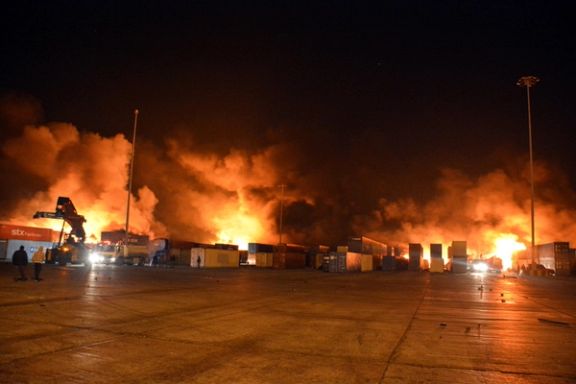
The group also alleged that Mahan was registering its interactions with IRGC-QF in one particular name, which appeared seven thousand times in the company’s records. “We’ve found Mahan does keep records of its suspicious business with QF under the name ‘Hamrah’, and that this business is managed by sardar (general) Golparast.”
The group added that Golparast is also listed as the owner of Qeshm Fars Air which “is a known QF cover company, frequently used to transport munitions throughout the Middle East,” the group said in November.
Israel is known to have conducted operations, including in Iran, to track and prevent IRGC-QF form transporting weapons to other countries.
Iran International reported July 21 that the Israeli Mossad had captured and interrogated an IRGC official inside Iran, about weapons transfers. The man was introducing himself as Yadollah Khedmati, deputy commander of the IRGC logistics and provided information to Mossad about weapons transfers before being freed.
IRGC’s wings for weapons transport
Mahan Air was fully under the control of IRGC-QF when Qasem Soleimani headed the extraterritorial military-intelligence unit. There were many reports about the airline’s role in weapons shipments. Soleimani was killed in a targeted US air strike in Baghdad in January 2020.
Amir Assadollahi a Mahan Air pilot revealed in June 2020 that on one occasion Soleimani in 2013 Soleimani was on a Mahan flight to Syria with 200 passengers and 7 tons of “banned cargo” that landed in Baghdad with orders of the Iraqi government. Soleimani instructed the pilot to bribe inspectors and was able to continue the flight to Syria.
Iran’s former foreign minister Javad Zarif in an audio recording leaked in 2021 had said that Soleimani preferred to use the official Iran Air flights for his purposes to reduce risk to his operations.
However, it seems that with continuing Israeli air strikes on Iranian arms depots in Syria, IRGC-QF prefers to use Mahan Air more often.
Israeli is usually silent about its attacks on Iranian targets in Syria but in recent months there have been repeated attacks on Iranian arms depots. The attack on the Damascus airport on June 10 was the 15th airstrike in Syria attributed to Israel.